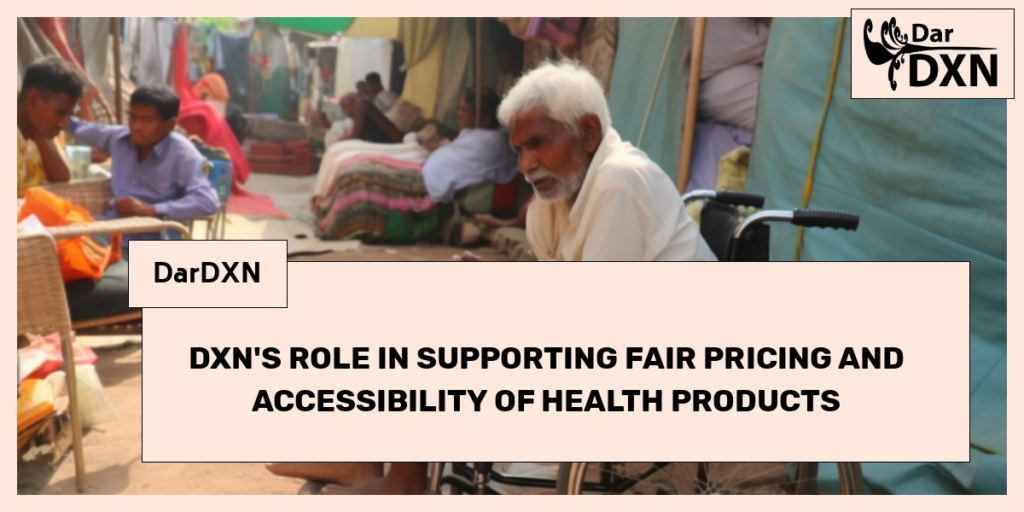In today’s world, health products have become a necessity for most people. However, the high cost of these products poses a challenge to those who cannot afford them, leaving them with no other option than to compromise on their health.
In light of this issue, DXN has emerged as an organization that plays a significant role in supporting fair pricing and accessibility of health products. DXN is committed to providing affordable and accessible health products to everyone regardless of their socioeconomic status.
The company believes that every individual should have access to quality healthcare without having to bear exorbitant prices. This approach towards healthcare affordability has led DXN to develop various initiatives aimed at reducing the cost burden for individuals seeking medical assistance.
Through its efforts, DXN has not only supported fair pricing but also increased accessibility by making sure that essential medicines are available even in remote areas where access may be limited. Therefore, understanding DXN’s contribution towards promoting equitable pricing and accessibility can help us appreciate the importance of such organizations in ensuring better public health outcomes.
The Importance Of Affordable Healthcare
Collaborative efforts between governments, healthcare providers, and pharmaceutical companies have been essential in ensuring the accessibility of health products.
Affordable healthcare is an indispensable element for a healthy society. Access to essential medicines should not be limited by income level or geographic location. Ensuring affordability of drugs and medical devices through government intervention can prevent catastrophic financial consequences for individuals and families.
Despite collaborative efforts to improve access to health products, high costs continue to pose challenges for many people around the world. The challenge of high health product costs has been a long-standing issue that requires continuous attention from all stakeholders involved in the production, distribution, and pricing of these products.
It is essential to find ways to address this problem while maintaining quality standards for these life-saving products.
The Challenge Of High Health Product Costs
The challenge of high health product costs remains a significant issue for many individuals and families worldwide. High prices can make it difficult for those in need to access the necessary products, leading to poorer health outcomes and decreased quality of life. The cost of drugs is frequently cited as one factor contributing to higher overall healthcare spending. In addition, newer therapies often come with a premium price tag due to high research and development costs.
The importance of advocacy cannot be overstated in addressing this issue. Advocacy groups play a critical role in raising awareness about the impact of high health product costs on patients, families, and communities. Through their efforts, they have been successful in pushing for reforms that increase transparency around drug pricing and promote greater competition among manufacturers. Additionally, government intervention has been effective in some countries through policies such as price controls or bulk purchasing arrangements.
In order to address these challenges, organizations must be committed to supporting fair pricing and accessibility for all individuals who require health products. DXN has demonstrated its commitment to this cause through various initiatives aimed at increasing access to affordable health products globally.
In the subsequent section, we will explore how DXN’s dedication to fair pricing plays out in practice.
Dxn’s Commitment To Fair Pricing
As discussed in the previous section, high health product costs pose a significant challenge for many individuals and communities worldwide. The issue is particularly pressing in low- and middle-income countries where access to essential medicines and healthcare services remains limited.
Several factors contribute to the high cost of health products, including research and development expenses, intellectual property rights, manufacturing costs, distribution fees, taxes, and markups. These costs can create financial barriers that prevent people from obtaining necessary treatments or force them into poverty due to out-of-pocket spending.
Collaborative efforts among various stakeholders are crucial for addressing the problem of high health product costs sustainably. Governments, non-governmental organizations (NGOs), pharmaceutical companies, academic institutions, patient groups, and other actors can work together to develop innovative solutions that lower prices without compromising quality or safety standards.
Sustainable solutions should consider the entire value chain of health products from research to delivery while balancing affordability with incentives for innovation and investment. By reducing inefficiencies in the system, promoting competition among suppliers, increasing transparency in pricing policies, and leveraging technology advancements such as telemedicine and e-pharmacy platforms; it is possible to improve accessibility to affordable health products globally.
DXN’s commitment to fair pricing aligns with these principles by advocating for consumer-oriented pricing policies that prioritize affordability without sacrificing quality or integrity. DXN has implemented several initiatives aimed at reducing cost burdens on consumers by creating direct-to-consumer sales channels through its multilevel marketing model; investing in efficient supply chains that minimize transportation costs; collaborating with local producers of raw materials to increase their capacity and reduce dependency on imports; using sustainable farming practices that promote environmental stewardship while lowering production costs; conducting clinical trials that generate evidence-based data supporting efficacy claims rather than relying solely on marketing hype.
In line with this vision, DXN has set up several programs designed specifically to support vulnerable communities who face challenges accessing health care facilities regularly. Through these initiatives’ implementation, DXN hopes to make a significant contribution towards improving the lives of people worldwide by providing them with access to high-quality health products without any financial burdens.
Dxn’s Initiatives To Reduce Cost Burden
Collaborative partnerships have played a significant role in DXN’s initiatives to reduce cost burden for health products.
The company has established strategic partnerships with suppliers and manufacturers of raw materials, which allows them to streamline production processes and lower costs while maintaining high-quality standards.
These partnerships also enable DXN to negotiate competitive pricing, which translates into affordable prices for consumers.
In addition to collaborative partnerships, innovative solutions have been key in reducing the cost burden for health products.
One example is DXN’s use of organic farming methods and sustainable practices that minimize waste and maximize yields.
This not only reduces production costs but also promotes environmental sustainability.
Furthermore, DXN invests heavily in research and development to create new product formulations that are more efficient and effective than traditional alternatives.
Through these efforts, DXN is able to provide high-quality health products at accessible prices without compromising on efficacy or safety.
As part of its commitment to improving access to healthcare globally, the subsequent section will explore how DXN provides access to essential medicines through various programs and initiatives.
Providing Access To Essential Medicines
It is no coincidence that access to essential medicines remains a major concern, particularly in low- and middle-income countries. The high cost of health products has significantly impacted the ability of these populations to obtain the medications they need for their well-being.
Moreover, despite global efforts aimed at improving accessibility and affordability, there are still many barriers to overcome.
Collaborative efforts between governments, non-governmental organizations (NGOs), and private sectors have played a crucial role in ensuring access to essential medicines. These groups work together through community outreach programs to increase awareness of available resources and educate individuals on how to manage their conditions effectively.
By working synergistically with local communities, such initiatives aim to promote sustainable development while also addressing immediate needs related to healthcare access. Through this approach, more people can be reached with critical information about medication pricing and availability.
Support For Remote Areas
Access to healthcare in remote areas can be challenging due to geographical barriers and lack of infrastructure. This often results in limited access to essential health products, which can further exacerbate existing health disparities. In recognition of this issue, DXN has implemented various initiatives aimed at providing affordable and accessible healthcare solutions for those living in remote areas.
One such initiative is the use of telemedicine solutions, which enable patients in remote areas to connect with doctors or medical professionals via video conferencing technology. The implementation of telemedicine not only improves access to medical care but also reduces costs associated with travel and accommodation expenses.
Additionally, mobile clinics have been deployed by DXN as a means of reaching underserved populations. These clinics provide basic health services including check-ups, vaccinations, and distribution of pharmaceuticals. By bringing these services directly to rural communities, DXN aims to ensure that everyone has access to quality healthcare regardless of their location.
As important as it is to make sure that people living in remote areas have access to affordable healthcare solutions, promoting equitable pricing must remain a crucial step towards achieving universal accessibility. In order for individuals everywhere to benefit from effective treatments and medications on an equal basis without facing undue financial burden, measures need to be taken that promote fair pricing policies across all regions.
With this understanding in mind, our next section will examine the role played by DXN in ensuring equitable pricing through its ongoing efforts towards creating sustainable supply chains that foster transparency and accountability throughout the entire process of production and distribution alike.
Promoting Equitable Pricing
Pharmaceutical pricing is an important factor in determining the accessibility of health products for individuals in different economic backgrounds.
Healthcare accessibility is also impacted by the availability of health products, which in turn is influenced by pricing structures.
Pharmaceutical Pricing
Fair pricing strategies in the pharmaceutical industry are crucial for ensuring accessibility and affordability of health products.
As a pricing and accessibility analyst, it is important to consider various factors such as research and development costs, production expenses, distribution costs, and marketing expenditures when determining fair prices for medications.
However, it is equally important to balance these factors with the need to make healthcare accessible to all individuals regardless of their socioeconomic status.
While pharmaceutical industry profits may be impacted by implementing fair pricing strategies, this should not deter companies from prioritizing equitable access to essential medicines over maximizing profits.
It is imperative that DXN continues to play an active role in supporting fair pricing initiatives that promote affordable healthcare solutions for patients worldwide.
Healthcare Accessibility
Moving on to the next subtopic, healthcare accessibility is a critical aspect of promoting equitable pricing in the pharmaceutical industry.
Despite fair pricing strategies being implemented, financial barriers can still prevent individuals from accessing necessary health products.
As a pricing and accessibility analyst, it is important to consider not only the cost of medication but also factors that impact access such as insurance coverage, geographic location, and socioeconomic status.
To promote healthcare equity, companies must work towards breaking down these barriers by providing assistance programs for low-income patients or collaborating with government agencies to expand access to essential medicines.
By prioritizing accessibility alongside fair pricing initiatives, we can ensure that all individuals have equal opportunities to receive the care they need without facing undue financial burdens.
The Role Of Dxn In Public Health
Public health is a critical concern that affects individuals and communities worldwide. One of the primary reasons for this is the availability, affordability, and accessibility of essential health products such as medicines, supplements, and other healthcare-related items. DXN recognizes its role in supporting fair pricing and accessibility of these products to promote public health.
Collaborative efforts have been one way that DXN has supported public health initiatives. The company works with governments, non-governmental organizations (NGOs), and community-based organizations (CBOs) to support underserved populations’ access to quality health products.
Community outreach programs are also an integral part of DXN’s approach to promoting public health. Through such initiatives, the company provides education on healthy lifestyles, proper nutrition practices, and offers affordable healthcare options for those who may not have access otherwise. Furthermore, DXN ensures that all its products meet regulatory standards globally while maintaining competitive prices to foster better outcomes across different socio-economic groups.
As we move forward towards a more equitable world where everyone has access to essential health products regardless of their economic status or geographic location; collaboration for better outcomes will continue to be paramount. This calls for increased partnerships between stakeholders in both the private and public sectors to ensure that no one is left behind when it comes to accessing quality healthcare services.
In doing so, we can create a healthier future for us all.
Collaboration For Better Outcomes
Partnering with communities and engaging stakeholders are crucial steps in ensuring fair pricing and accessibility of health products. DXN recognizes this and has implemented various initiatives to collaborate with different sectors to achieve better outcomes.
One example is their partnership with local farmers for the production of high-quality raw materials. By sourcing from local communities, DXN not only supports small-scale farming but also ensures a stable supply chain that results in cost-effective prices for consumers.
Furthermore, they engage with healthcare professionals through educational programs and workshops that provide insights on the benefits of natural health products as an alternative treatment option. Through these efforts, DXN fosters collaboration between different stakeholders towards achieving a common goal – affordable and accessible healthcare for all.
Conclusion: A brighter future for healthcare accessibility lies ahead if we continue to prioritize partnerships and stakeholder engagement. As more organizations recognize the importance of collaboration, we can expect to see even greater strides towards improving access to life-saving medications and treatments. With continued effort, it is possible to create a world where everyone has equal opportunities when it comes to quality healthcare – regardless of socio-economic status or geographic location.
Conclusion: A Brighter Future For Healthcare Accessibility
Collaborative efforts of various stakeholders have been instrumental in improving the accessibility and affordability of health products. The role played by DXN, a leading player in the healthcare industry, is noteworthy in this regard. By focusing on fair pricing and making quality products accessible to all sections of society, DXN has set an example for others to follow.
Sustainable solutions that can ensure equitable access to essential health products are crucial for achieving universal health coverage. In this context, it is heartening to note that many companies like DXN are taking proactive steps towards achieving this goal. With their commitment to fair pricing and accessibility, these companies are contributing significantly towards ensuring that everyone has access to medicines and other healthcare essentials they need.
It is hoped that this collaborative effort will continue and lead us towards a brighter future where no one is left behind due to lack of access or affordability.
Frequently Asked Questions
What Specific Health Products Does Dxn Offer And How Do They Determine Their Pricing?
When considering the health benefits that DXN offers, it is important to note their pricing strategy.
As a health products pricing and accessibility analyst, I have found that DXN determines their prices based on factors such as production costs, market demand, and competitor pricing. However, they also strive to maintain fair prices for consumers while still ensuring profitability.
To achieve this balance, DXN utilizes various cost-saving measures in their supply chain and distribution channels. Additionally, they offer discounts and promotions to make their products more accessible to a wider range of individuals.
Overall, DXN’s pricing strategy reflects their commitment to providing high-quality health products at reasonable prices while remaining competitive in the market.
How Does Dxn Ensure That Their Commitment To Fair Pricing Doesn’t Compromise The Quality Of Their Products?
When it comes to health products, quality assurance and fair pricing are two sides of the same coin.
DXN understands this dynamic and has implemented a variety of pricing strategies that prioritize accessibility without compromising product quality.
However, ensuring fair pricing doesn’t just mean setting low prices; rather, it requires a nuanced approach that balances cost with value.
To achieve this balance, DXN employs rigorous quality control measures at every stage of production, from sourcing raw materials to final packaging.
By doing so, they can confidently offer their customers affordable access to high-quality health products without sacrificing on excellence or ethics.
In essence, DXN’s commitment to fair pricing is like walking a tightrope: maintaining equilibrium between affordability and premium quality is key for success in the market.
Can You Provide Examples Of Specific Dxn Initiatives That Have Successfully Reduced The Cost Burden For Consumers?
The impact of DXN’s pricing initiatives on consumer behavior has been a topic of interest among health products pricing and accessibility analysts. In response to the growing concern over the affordability of health products, DXN has implemented various initiatives aimed at reducing the cost burden for consumers.
Success stories of low income communities benefiting from DXN’s products have been reported as evidence of its commitment to fair pricing and accessibility. For instance, through its One World One Market campaign, DXN has created a platform that enables customers in different countries to purchase its products at uniform prices, regardless of their location.
Additionally, DXN offers discounts to members who purchase its products regularly, thus making them more affordable for those with limited financial resources. These initiatives have not only contributed to increased access to high-quality health products but also improved the quality of life for many individuals around the world.
How Does Dxn Ensure That Their Products Are Accessible To Low-Income Communities And Individuals In Remote Areas?
Community outreach and distribution strategies are crucial in ensuring that health products reach low-income communities and individuals living in remote areas.
DXN, as a company committed to supporting fair pricing and accessibility of health products, has implemented several initiatives to address this issue. Through its community outreach programs, the company works with local organizations to identify the needs of underserved populations and provide them with access to high-quality health products at affordable prices.
Additionally, DXN’s distribution strategies focus on ensuring that these products are available in remote areas through partnerships with local distributors or by establishing their own distribution networks. By addressing both community outreach and distribution challenges, DXN is able to ensure that their products are accessible to all, regardless of income level or location.
What Partnerships Or Collaborations Has Dxn Established With Other Organizations Or Governments To Improve Healthcare Accessibility?
Public-private partnerships and community outreach programs have become increasingly popular in the healthcare industry to address accessibility challenges.
DXN, a leading health products company, has established strategic collaborations with various organizations and governments worldwide to improve healthcare access for disadvantaged communities.
For instance, they work closely with local community-based organizations to identify areas lacking adequate healthcare services and provide them with necessary support.
Additionally, DXN partners with government agencies to facilitate affordable pricing of their products to ensure that even low-income households can afford quality healthcare products.
Through these efforts, DXN is playing a crucial role in promoting equitable access to essential health products globally.
Conclusion
DXN is a leading global health products company that offers a wide range of natural and organic supplements, personal care items, and food and beverage products. The company’s commitment to fair pricing and accessibility has been at the forefront of its mission since it was founded in 1993.
DXN determines its pricing based on several factors, including production costs, market demand, and competition from other similar products. However, despite their focus on affordability, DXN never compromises on product quality. They ensure that all their products are made using high-quality ingredients and undergo rigorous testing to guarantee safety and efficacy.
To reduce cost burdens for consumers further, DXN has implemented various initiatives such as loyalty programs, referral bonuses, discounted rates for bulk purchases, and free shipping promotions. DXN also ensures that their products are accessible to low-income communities by offering special discounts or price reductions during specific events or campaigns.
Additionally, they collaborate with local organizations and governments to distribute health products to remote areas where access is limited due to economic or geographic barriers. In conclusion, the efforts put forth by DXN towards ensuring affordable prices and accessibility for their health products have significantly impacted many individuals’ lives worldwide.
By collaborating with different stakeholders globally while prioritizing customer satisfaction over profit-making ventures through providing quality goods at reasonable prices; DXN remains dedicated to making healthcare available to everyone regardless of their social status or geographical location. As Aristotle said: ‘quality is not an act; it is a habit.’ And DXN’s habit of prioritizing fairness in pricing healthcare solutions sets an excellent example for others in the industry.







